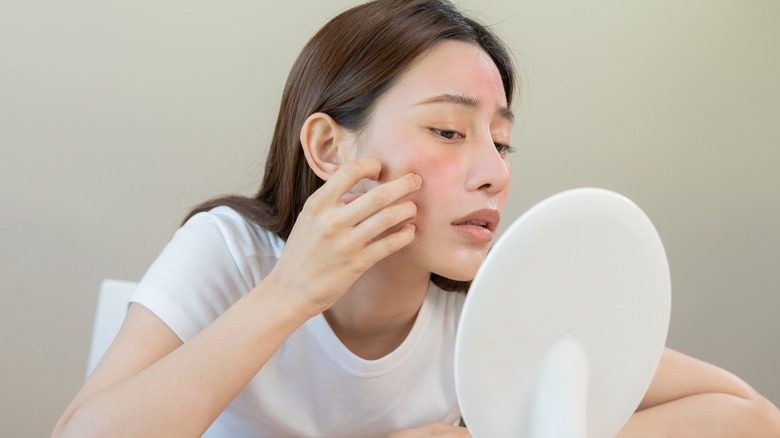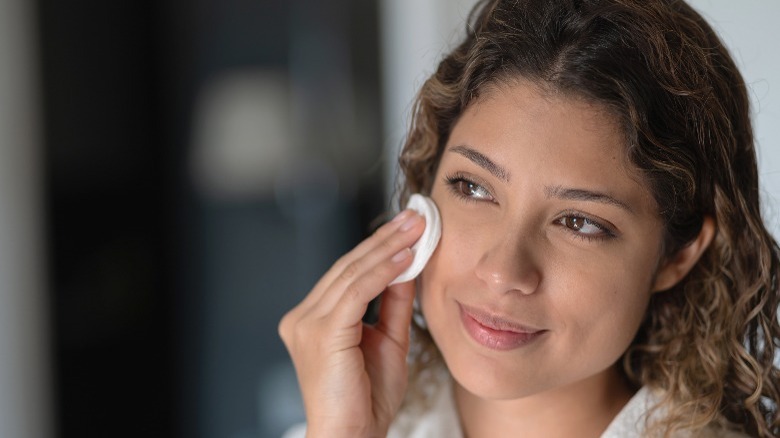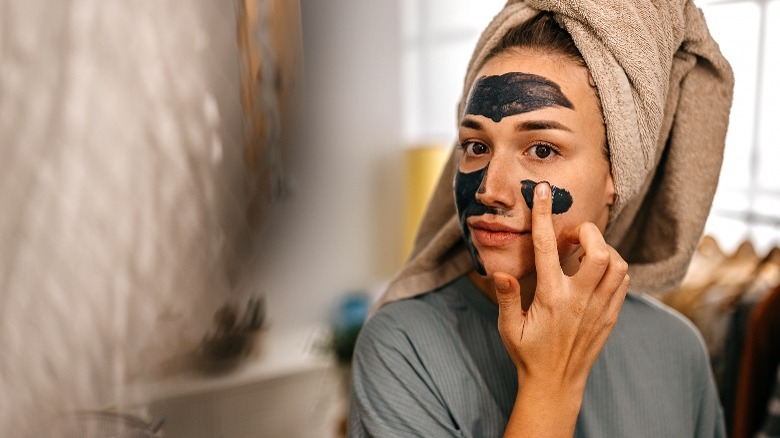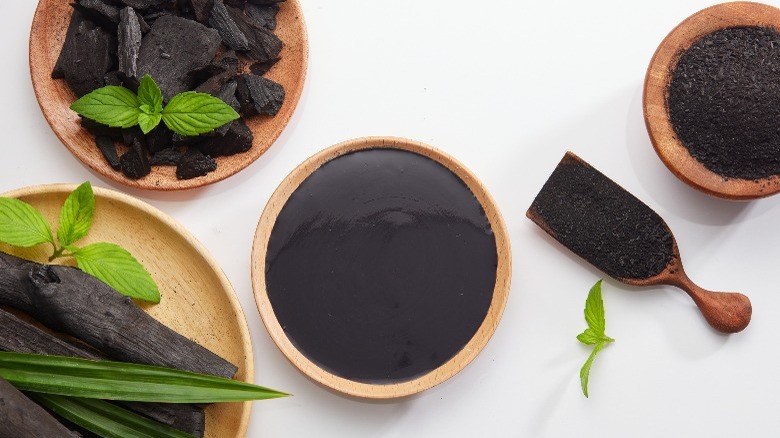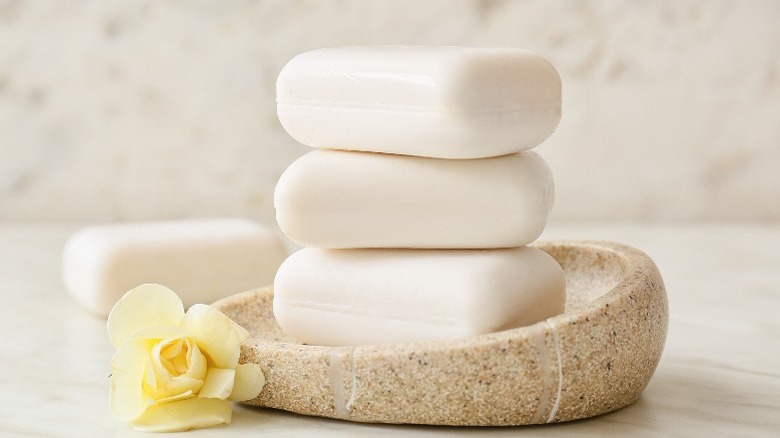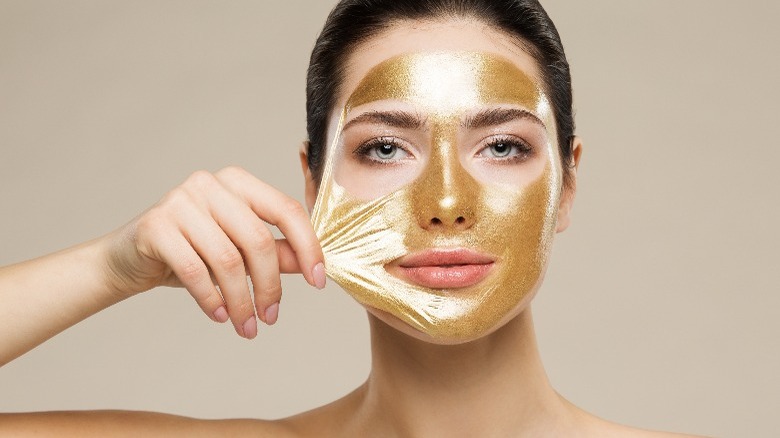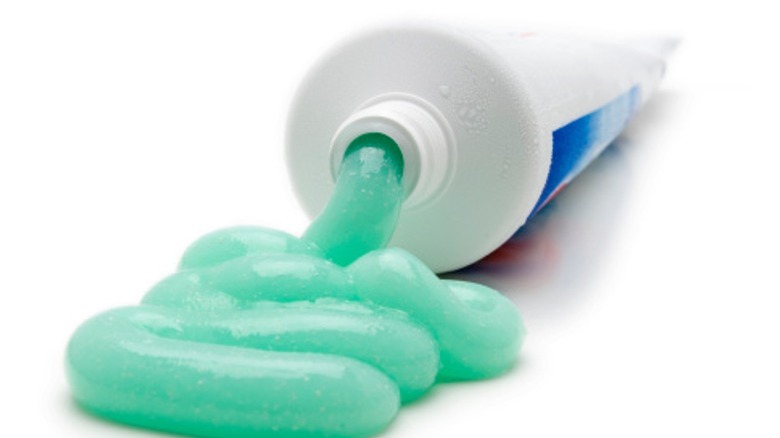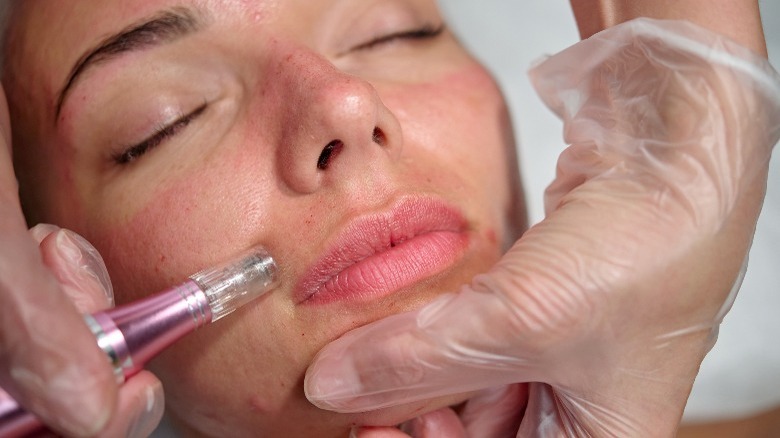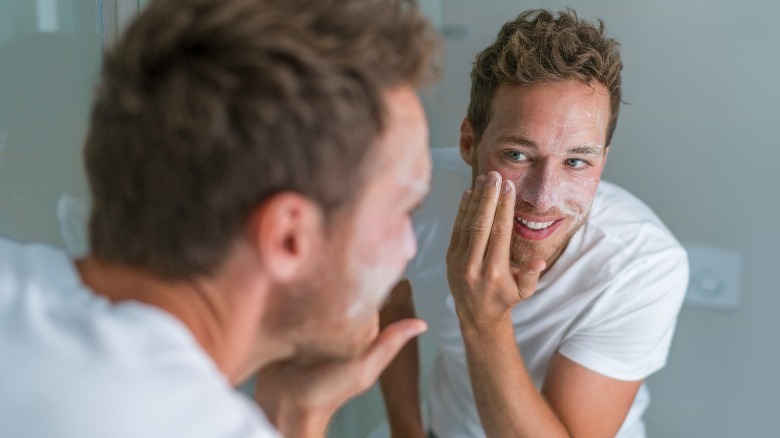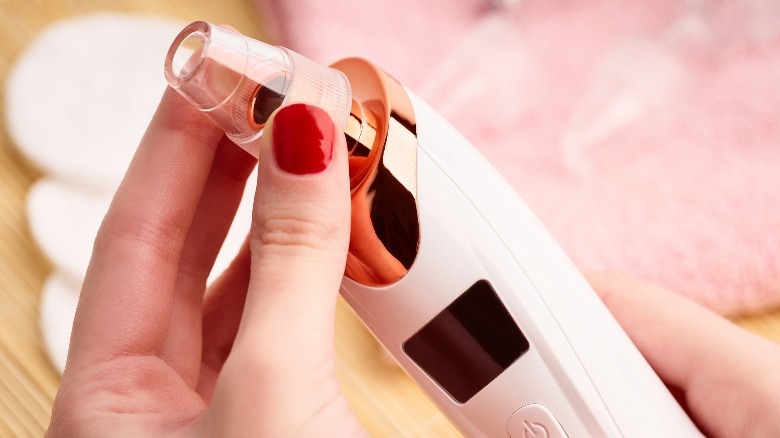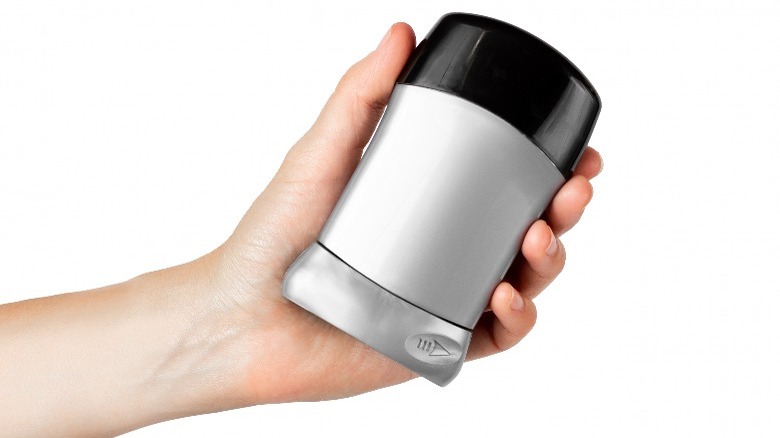Popular Skincare Hacks That Could Pose Health Risks
Skincare has come a long way from the days of heavy cold cream and harsh bar soap. In a quest to help people preserve a youthful appearance, the skincare industry has evolved facial products to include nourishing ingredients that promote moisture, elasticity, and protection from harmful UV rays and toxins. According to data from Statista, the skincare sector in the United States is projected to hit a revenue of $21.09 billion in 2023 and grow by 3.42% annually through 2027.
With the sheer number of products out there, it's not always easy to keep up with the best treatments on the market — and the top brands can be pricey and not accessible to the average American. As a result, many people are looking for the next best thing and want to jump on the popular skincare hacks that promise glowing skin without the cost of expensive products. Unfortunately, these shortcuts aren't always the best solution.
Some skincare regimens gain popularity through social media influencers or celebrities who sing their praises. While these treatments may work for some, other people may experience negative effects that often leave lasting damage. Here are some skincare hacks that may do more harm than good, and why you should be cautious before trying them.
Astringent toners
There's no question that a good skincare routine can keep your skin looking and feeling its best. As explained in an article in The New York Times, the three basic elements of a solid skincare routine include cleansing, toning, and moisturizing. However, some people do not fully understand the purpose of toning and why it's an important step in caring for the skin.
Rather than further cleansing the skin and removing impurities, toner should add moisturizing and soothing ingredients. Toning is a restorative process that helps balance your skin's pH levels. Sarah Lee and Christine Chang, co-founders of Flow Recipe, shared in an interview with Byrdie, "Many U.S.-made toners are used as an astringent to help remove any left-over residue, dirt, oil, or makeup that is left on the skin after cleansing." They go on to explain that Korean toner is different and add, "Instead, it's the first leave-on step of liquid hydration that treats the skin."
If you're using an astringent toner to cleanse your skin or remove makeup, you're skipping an essential step in your skincare routine. Shift your approach to think of toning as completely separate from cleansing. To reap the most benefits of toning to balance your skin, opt for hydrating toners that contain ingredients like hyaluronic acid, glycerin, and antioxidants like vitamin C (via Forbes).
DIY Masks
Skincare face masks can improve the health and appearance of your skin with hydrating, anti-inflammatory, or exfoliating ingredients that are absorbed into the pores. The mask creates a barrier on the skin that provides a concentrated dose of these beneficial ingredients that penetrate the skin more deeply than a simple cream or other topical treatment (per Penn Medicine). Finding the best balance of ingredients and using them the right way can give your skin the boost it needs to look fresh and radiant.
Although you might have ingredients in your kitchen or pantry that could have beneficial effects on your skin, you may want to reconsider making your own facial or beauty masks. Do-it-yourself (DIY) masks require mixing your own materials and finding the ones that work best for your skin. Unless you're a cosmetic chemist, you probably don't have the knowledge or skill to determine the right concentration of ingredients and which ones work together (via L'Oréal Paris).
Because some ingredients do not mix well with others or can even irritate the skin if you don't use the right ratio, DIY masks can clog pores, cause redness or burning, prompt breakouts or hives, and make your skin dry (via Penn Medicine). However, if you really want to try a DIY face mask, be sure to test a small area of your skin before applying it all over your face.
Charcoal products
Activated charcoal is a black, odorless powder used for several purposes, including filtering water and treating overdoses in emergency situations. With such a strong ability to absorb toxins, it makes sense that skincare companies began incorporating charcoal into products like face wash and blemish treatments to improve the skin's appearance and texture. However, activated charcoal's effectiveness in treating skin issues is still unclear (per Medical News Today).
Acne products that contain activated charcoal can potentially work wonders for some individuals. A study published in the Journal of Pharmacy Research & Technology found that activated charcoal masks helped to remove impurities and dead skin cells in a small group of female test subjects. For others, daily use of activated charcoal can cause the skin to become dry and irritated.
Dr. Corey L. Hartman, dermatologist and founder of Skin Wellness Dermatology, told Today, "Activated charcoal can remove too much oil and moisture from the skin's surface, which can lead to flaking or irritation." If you have sensitive or acne-prone skin, ask your doctor or dermatologist if activated charcoal is appropriate for your skin or if there are any charcoal products to avoid.
Bar soap
Soap is a product made by mixing animal or plant fat with a base called lye. The combination of these ingredients creates soap molecules with two distinct ends — one that repels water and attracts oil, and the other that binds with water. The first end of the molecule traps grease and dirt, while the other water-loving end of the molecule clings to running water and rinses everything away. Although these molecules make soap effective at cleaning and sanitizing, they can also be harsh on the skin.
As explained by Healthline, traditional bar soaps come with common side effects that can disrupt the balance of your skin. For example, bar soap can be abrasive and irritating to the delicate skin on your face and other parts of the body. Soap can also cause redness and irritation from heavy scents or dyes. Additionally, soap will pull essential moisture from the skin and often leave you feeling dry, itchy, and flakey.
Rather than using bar soaps, look for cleansers that contain hydrating ingredients that soothe the skin while cleaning it. Types of products that work well for facial skin include cream, foam, or gel cleansers that address specific skin issues.
Peel-off masks
If you're struggling with dull, dry skin, a peel-off mask might sound like a great solution to remove dead skin cells and start fresh. These masks cling to the skin and dry up after several minutes before you literally peel it off your face. While this process does strip away dead skin and pore-clogging buildup, you could also be removing the essential barrier your skin needs to stay hydrated and balanced.
In an interview with The Zoe Report, board-certified dermatologist Dr. Devika Icecreamwala said, "The peeling motion can be harmful because it can disrupt the skin barrier and lead to a lot of irritation." The article goes on to explain that this protective barrier, called the stratum corneum, is what defends the skin against outside toxins, aging, acne, and other inflammatory conditions. When the delicate balance of this barrier is damaged, your skin can become more prone to the issues you're trying to avoid by using the peel-off mask.
Sunscreen contouring
One skincare hack that many TikTok users have tried is sunscreen contouring. For the past decade, contouring has been a popular beauty trend that involves applying darker and lighter shades of makeup to highlight certain facial features and add the appearance of dimension and angles. Those doing sunscreen contouring try to achieve the same results by strategically applying sunscreen to the parts of the face they want highlighted.
The idea behind sunscreen contouring is to allow parts of the face to become tan while others are protected from the sun's rays to create the same effect as using makeup. However, sunscreen contouring can be incredibly damaging to the skin because it requires hours in the sun. Dermatologist Michele Maouad of the Dermatology Center for Skin Health explains, "Even though it might appear aesthetically beautiful for the moment, the non-protected areas are at high risk for burn, thus leading to skin cancer and unevenly sun-damaged skin.
According to the National Institute on Aging (NIA), spending too much time in the sun can lead to wrinkles, age spots, discoloration, and skin cancer. To keep skin healthy, the NIA recommends limiting time in the sun, daily use of broad-spectrum sunscreen, wearing protective clothing, and avoiding tanning.
Toothpaste pimple treatment
If you've ever dealt with lingering breakouts at the worst possible times and need them to go away quickly, you may have heard of the toothpaste spot treatment trick. Some people claim that a dab of toothpaste on a pimple left overnight is the foolproof way to zap a zit for good. Unfortunately, like many other skincare hacks, toothpaste pimple treatment can actually do the exact opposite of what you were hoping to achieve.
Most toothpastes contain powerful ingredients designed to strengthen tooth enamel and fight tartar buildup. According to the Cleveland Clinic, these ingredients are too harsh for delicate facial skin and can lead to inflammation, redness, burning, and irritation. When the goal is to reduce the appearance of a pimple, these are the last things you want to do to your skin.
Instead of toothpaste, talk to your dermatologist about effective acne treatments that could work for your skin type. Typically, salicylic acid or benzoyl peroxide are common ingredients in acne-fighting products that will help to clear your skin and prevent breakouts from developing.
Microneedling
As explained by the U.S. Food & Drug Administration (FDA), microneedling is a popular skincare technique that involves pricking the skin with tiny needles to treat signs of aging or reduce facial scarring. By damaging the outer layer of skin, microneedling stimulates the skin's healing process, which involves the production of more collagen and elastin (via Medical News Today). Both of these key proteins help to maintain the skin's firmness and smooth texture.
While it may sound like an extreme procedure, it's actually a minimally invasive treatment that doesn't cause too much discomfort for patients. The doctor applies a numbing cream before the procedure to prevent pain. However, this technique is not ideal for everyone.
The FDA lists the risks of microneedling, which includes bleeding, bruising, redness, itching, peeling, and tightness of the skin. Some people may also experience skin discoloration, cold sore flare ups, swollen lymph nodes, and, in some cases, skin infections. The Cleveland Clinic also cautions against microneedling if you suffer from acne, have a blood disorder, take anticoagulants, are receiving chemotherapy or radiation therapy, have a tendency to develop skin rashes or keloids, or have eczema or psoriasis. If you fall into any of these categories, you should probably steer clear of microneedling.
Slugging
Slugging is a recent skincare trend that gained momentum as a viral TikTok beauty hack. It involves slathering the face with an occlusive ointment, like petroleum jelly, to lock in hydration and allow the skin to fully absorb the skincare products you apply underneath. It's meant to be the last step in your skincare routine before you turn in for the night.
While slugging offers several benefits and works well for many people, the technique could cause damage if it's not done the right way. Others who have certain skin issues may also experience negative effects from slugging. For example, board-certified dermatologist Dr. Sheilagh Maguiness told Elle, "Individuals with active acne breakouts or blackheads should probably avoid this technique and opt instead for treatment with ingredients aimed at fighting acne, such as salicylic acid, benzoyl peroxide, and topical retinoids."
The Cleveland Clinic adds that some active ingredients in skincare products do not pair well with slugging. Alpha hydroxy acids, beta hydroxy acids, and retinoids can be too harsh on the skin and cause irritation when they are trapped beneath petroleum jelly. If you use any products with these ingredients, slugging is probably not the best technique to keep your skin looking fresh and hydrated.
DIY exfoliation scrubs
Exfoliating your skin is an essential skincare practice that can boost your skin's appearance, texture, and tone. Some benefits of using a granular scrub to exfoliate the skin include removing dead skin cells, unclogging pores, brightening the complexion, and helping the skin better absorb skincare products. Finding the right exfoliant for your skin will help you get the most out of the process while maintaining your skin's moisture and elasticity.
While there are several recipes for DIY exfoliation scrubs online, it's important to approach them with caution. Certain ingredients can be too harsh for sensitive skin and cause harmful effects. According to Healthline, some sugar scrubs are overly rough and can cause small tears in the skin. Sugar scrubs can also lead to dryness, redness, irritation, noticeable scratches, and wounds. If you don't create the right texture or balance of ingredients in your DIY scrub, you run the risk of some of these side effects.
Additionally, DIY skincare is not regulated and does not contain helpful preservatives that prevent bacteria from growing. By using your own exfoliating scrub, you could not only inadvertently create microscopic tears in the skin, but you might be applying a product containing bacteria that can enter these wounds and cause an infection.
At-home pore vacuums
People who struggle with blackheads and clogged pores know how difficult it can be to remove these skin blemishes. As dead skin cells and oil become trapped in a hair follicle, it leads to blackheads that cause the skin to appear dull, uneven, and discolored. However, removing these blackheads can be tricky without damaging or irritating the skin in the process.
A pore vacuum or blackhead vacuum is a small device used to suction dead skin and other pore-clogging debris out of the pores. Treatment involves running the small handheld device over the skin as it gently pulls the blackheads from the pores and clears the skin of dirt and oil. If this skincare hack sounds too good to be true, that's because it is — in some cases. It's important to keep in mind that pore vacuuming doesn't always work for every person.
According to Healthline, some risks associated with pore vacuums include bruising, discoloration, developing spider veins and broken blood vessels, tiny skin tears, and scabbing from skin damage. When the pore vacuum is used incorrectly or by an untrained person, these risks increase and could potentially leave long-term damage.
Potato acne hack
When acne flares up and you develop painful red pimples, you may be willing to try almost anything to get rid of them. Another TikTok beauty trend that was making its rounds on social media claimed that raw potatoes were the secret to reducing the symptoms of large cystic acne. TikTokers applied a cut piece of potato directly to the acne bump and left it there for several hours or overnight.
A study published in Life Sciences shares that potatoes are rich in anti-inflammatory cytokine and azelaic acid. They also contain vitamin C and small amounts of salicylic acid, which can help treat pimples. While there may be some skin benefits from the ingredients found in potatoes, they're not exactly a miracle cure. Also, this is one skincare hack that's not for everyone.
If you happen to have a latex allergy or sensitivity to latex, potatoes can trigger a serious allergic response. A study published in Clinical & Experimental Allergy found that potatoes caused clinical allergic reactions in people with latex allergies. In an interview with Byrdie, board-certified dermatopathologist Gretchen Frieling shared, "Patatin is a major cause of potato allergy. So, if you have a known allergy to latex, do not use raw potatoes on your skin."
Deodorant as face primer
Another questionable skincare hack is using deodorant as a primer to prep your face before applying makeup. The idea behind this trend is that deodorant will keep the skin from becoming oily or sweaty — particularly in the T-zone, which is notorious for being oily. The truth is that the skin on your face is very different from your armpit skin. Deodorants and antiperspirants may contain ingredients that can irritate facial skin, clog pores, and cause breakouts.
One of the key ingredients in antiperspirants that prevents sweating is aluminum, which has been linked to health issues. Although more research is needed to investigate the risks of using antiperspirants with aluminum, there may be a connection to bone disease, dementia, and cancer (via Penn Medicine). In addition, deodorants and antiperspirants typically contain parabens and chemicals that can further irritate sensitive facial skin.
If you're trying to fight oily skin, don't reach for deodorant as the solution. Invest in a high-quality primer that is specifically designed to mattify the skin and keep shine in check. You should also talk to your doctor or dermatologist about possible causes of your oily skin and if there are any changes you can make to your daily routine that might help.

